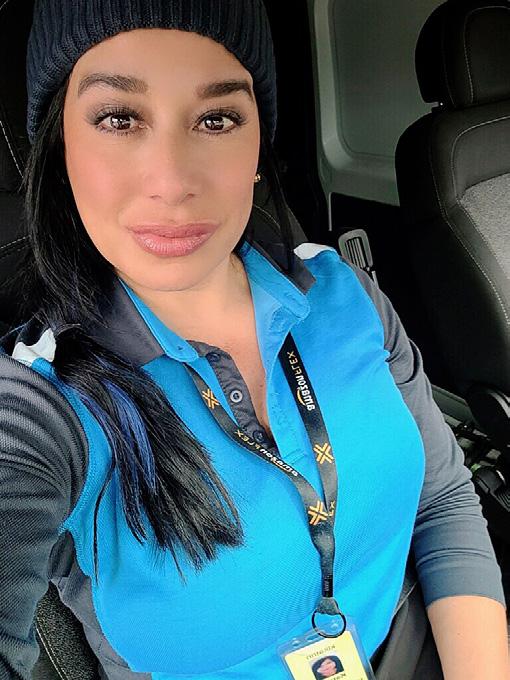
4 minute read
She’s All That
By Khayla biscoe
Last February, 60 female recruits arrived at the Marine Corps’ all-male training site in San Diego, where they attended co-ed boot camp for the first time in the base’s 100-year history. The Corps had been hesitant to embrace the idea of co-ed training, even after combat positions opened for women in 2013.
Paving the way for aspiring women marines, they are transforming the process of making new recruits into leaders, combat fighters, logistical supporters and Marine Corps Reserves by learning side by side with men. This news caught the attention of the public and sparked controversy around the women earning a known “masculine” role.
The principle that women can’t be successful in a “man’s” setting is as old as human society. The Women’s Rights movement has made meaningful progress, but there is still plenty to change. Whether in sports, technology, entertainment, law enforcement, or any number of other professions, it can seem almost foreign for a woman to be an authority. Let’s hear firsthand from two women who have redefined what it means to work in a “masculine” position.
Katrina Klein knows all about what it takes to push your physical and mental mindset to be successful in an unconventional role. She currently works as a delivery specialist with Next Level Logistics, Amazon’s new delivery service, where she is proving to be a jack of all trades. Next Level launched in November of 2020, and Klein has already become a proficient leader, efficient multi-tasker, and reliable problem solver.
“I was hired in October of 2020. My job consists of delivering packages, dispatching drivers, conducting interviews, and dealing with human relations type duties,” Katrina explains. While driving and delivering packages herself as well, she has to have the physical capacity to load and unload weighted packages to ensure the stay intact. But not all strength is physical.
“The men I manage come from all walks of life, and from many hard places,” she states. “Having said that,
Taking Over The Badge
Nearly 13% of U.S. police officers are women, but when Patricia Diaz joined the City of Phoenix Police Department in 1986, that number was closer to 5%. She worked as an officer for eight years before becoming a 911 dispatcher.
Diaz says she initially joined because she had become a mother at a young age and was attracted to the salary. Before applying, she faced resistance inside her own home.
“I remember when I first told my husband that I wanted to be a police officer. He was very upset and often discouraged me,” Patricia remembers. “I didn’t feel like I initially had the support. But when someone tells me I can’t do something, I only want to show them I can.”
Her husband was so reluctant because he knew that it was a tough environment. Having to be in a position that required so much physical and emotional strength didn’t seem to match her character. The discouragement didn’t stop there. Close family and friends told her that it would be too demanding and would require a lot of physical power. Patricia never fully understood why she faced so much resistance, but she knew there would be more men who would doubt
it was important for me to hold my own, or they will walk all over you. Gaining knowledge in my field, and

possessing wisdom from years of experience in management, helped me hold a position of authority with minimum friction or pushback from employees.”
Before joining Next Level, she retired from a 3-year career as a 911 dispatcher and supervisor. She worked in a fastmoving environment with male police, firefighters and ambulance workers and had to give direction while lives were at stake. She had to think quickly and be assertive, she says.
At Next Level, she works with a diverse group of men that show mutual respect and teamwork.
“I am very proud that I was entrusted to work side by side with such an intelligent boss,” Katrina says. “He's allowing me to help mold his business into a successful little empire. He supports my decisions and never undermines me.”
Katrina values having a diverse team at her side and doesn’t fear any perceptions people might have about the abilities of women in leadership roles. She feels comfortable in her workspace and has the freedom to fulfill her duties without facing setbacks. Something that all women should feel.

her ability to perform and question whether she could succeed in such a commanding, rough and assertive field. For the next six months, Patricia indulged in training that consisted of learning state law, criminal investigation, patrol procedure, firearms training, traffic control, defensive driving, self-defense, first aid, computer skills, and more. As the only woman in her class, she endured stereotypical gendered insults about being bossy and mean. She never fed into it.
“I never saw it as an issue for a woman to be working in what’s seen as a ‘masculine role,’” Patricia explains. “I ended up graduating at the top of my class with the highest score.”
She felt empowered that she was able to say “I told you so.” After her 6-month training, she successfully transitioned from citizen to police officer. She learned what it really meant to be a person of authority and grew used to working with men fairly quickly, she says.









